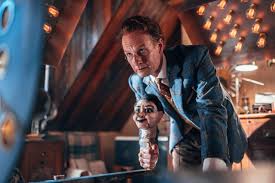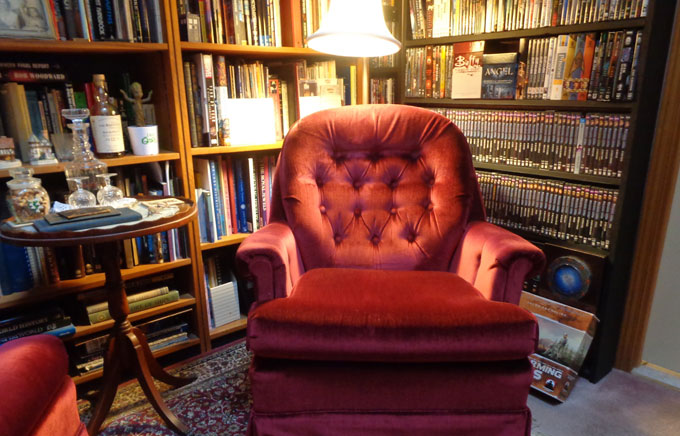
The Doctor (David Tennant) and companion Donna Noble (Catherine Tate) are transported by UNIT to its headquarters because the world’s population has suddenly become violent. They are met by Shirley Bingham (Ruth Madeley), Kate Lethbridge-Stewart (Jemma Redgrave), and Melanie Bush (Bonnie Langford), who is a former companion of the Doctor. The Doctor discovers that the worldwide violent madness is caused by a giggle from a Stooky Bill film in 1925, which John Logie Baird had recorded to demonstrate his new invention—television.
The Doctor and Donna go back to 1925 and learn that the Doctor’s old enemy, The Toymaker (Neil Patrick Harris), transmitted the signal to make everyone aggressively convinced of the absolute correctness of their beliefs. (So that’s where that comes from!) The Doctor and the Toymaker play cards and the Toymaker wins. But the Doctor says that since he won the first time, long ago, they are tied. The Toymaker wants a final game, so he transports to the present day, and the Doctor and Donna pursue him.
The Toymaker attacks UNIT and takes control of a graviton beam cannon. Since he has played against a new Doctor incarnation in the previous two games, he reasons that he needs another Doctor, so he triggers the Doctor’s regeneration. But the current Doctor does not die and now there are two doctors--David Tennant and Ncuti Gatwa, the fifteenth Doctor, each of which challenges the Toymaker to a game of catch. The Doctors win and the Toymaker is banished from existence.
On Board the TARDIS, the Fifteenth Doctor tells the Fourteenth that he needs to recover from the trauma of his incarnations. Donna thinks his old face has returned because he is emotionally exhausted. She invites him to consider retirement with her and her family, but he hates to leave the TARDIS. The Fifteenth Doctor thinks the Toymaker’s rules still apply and another prize is needed. He uses the TARDIS to create a second TARDIS and departs cheerfully. The Fourteenth Doctor settles down with Donna’s family and the new Doctor travels the universe.
This is the third episode of the 60th Anniversary Special, written by Russell T. Davies, directed by Chanya Button. The Celestial Toymaker appeared to the First Doctor, William Hartnell, in 1966. The special received positive reviews but the appearance of two Doctors was controversial. Lifesize marionettes appeared in the episode, animated by Brian Fisher and his team, including Neil Patrick Harris, who has been a puppeteer himself. There are puppets of Amy Pond, Clara Oswald, and Bill Potts, all former companions who died in the series.
A double stood in for Bernard Cribbins, who was ill and died soon thereafter. Neil Patrick Harris had never heard of the Doctor Who series. There is a colourized flashback of William Hartnell, the First Doctor, and of Michael Gough, the original Toymaker. A new version of the show’s theme was composed by Murray Gold. Pam Downe designed the four costumes in which the Toymaker appeared.
When the Tenth Doctor appeared as the Fourteenth, he did so in the Tenth Doctor’s clothing, also designed by Pam Downe, not the Thirteenth Doctor’s, because Davies did not want to deal with the controversy of a male Doctor appearing in a female Doctor’s clothing. This strikes me as a bit old-fashioned for a series so proud of having a transgender character. Frankly, I always thought that Jody Whittaker’s costume was kind of mannish, and she wasn’t very female in general. I would frankly have enjoyed seeing a Doctor who had been male for millennia trying to cope with being female. If that’s not Transgender, what is? Science fiction fans have been familiar with the whole transgender concept since Robert Heinlein explored it in 1959. Why have the Doctor appear as a woman if you don’t examine the whole fascinating topic of gender? TV always seems to be walking on eggshells.
